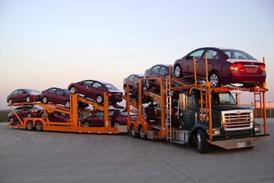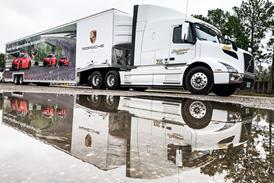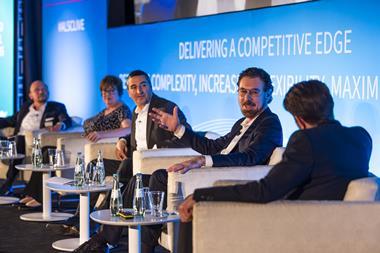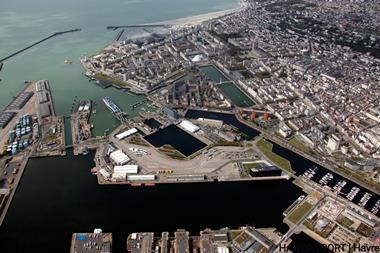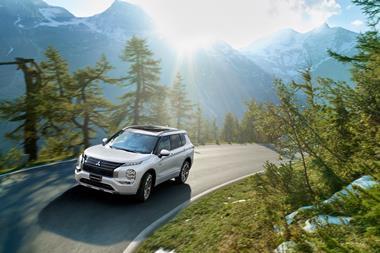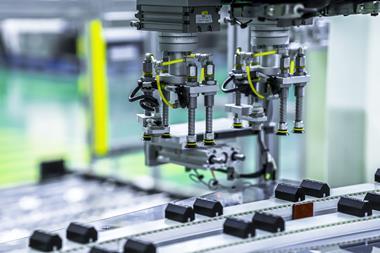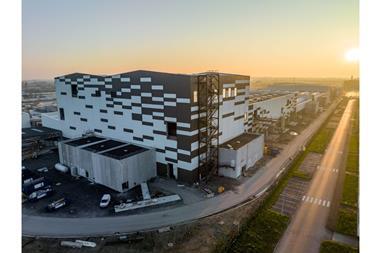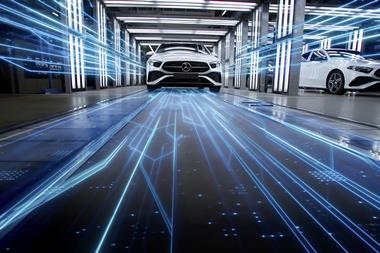 With foreign investment and favourable legislation, Nigeria could spring from automotive stagnation to overtake South Africa as the continent’s lead car manufacturing country. But the supply chain will be a major challenge.
With foreign investment and favourable legislation, Nigeria could spring from automotive stagnation to overtake South Africa as the continent’s lead car manufacturing country. But the supply chain will be a major challenge.
Nigeria’s once thriving domestic car assembly industry may be soon be reborn after years of stagnation nearly brought it to the point of extinction. If President Goodluck Jonathan’s government gets its way, vehicles stamped ‘Built-in-Nigeria’ may become the preferred choice for motorists once again, with new legislation intended to favour local assembly over mass imports. OEMs are already starting to invest in what is Africa’s biggest and fastest growing economy. Importers and distributors are looking to partner with carmakers to manufacture and sell vehicles locally.
However, such a transition will be far from easy. The current market is dominated by used car sales and there may be resistance to the price rises that follow policies encouraging local production. Likewise, the industry in its present form has been protesting the changes, including maritime and port workers who currently handle the bulk of imports coming into the country. Should the policy take off, it seems likely that Nigeria will see a big drop in the roughly 200,000 (mainly used) cars that it imports every year. It could, however, see a rise in the import of knockdown kits and, eventually, a bump in exports.
Security, power and transport infrastructure, along with logistics and manufacturing competencies, could be another issue. Nigeria is ranked 75th globally on the World Bank’s international logistics performance index, just behind Kenya and ahead of Venezuela, as the country suffers from poor port and road infrastructure, handling and customs processes. According to the World Bank, lead times for moving material to or from ports in Nigeria are about twice as long as those for South Africa, the regional powerhouse with which Nigeria will compete. Clearance times for imports and exports without physical clearance takes an average of five days for Nigeria, compared to just one day in South Africa.
However, the country also has plenty of advantages, such as fast economic growth, relatively low wages, and fewer union disputes than South Africa. Manufacturers, including Nissan and Peugeot, are already making strong moves into the country. The logistics of moving kits and material into Nigeria, as well as domestic vehicle distribution, require significant investment and carry big risks – but could offer even bigger rewards.

Nigeria’s car industry has seen good times before. An oil boom, in full swing during the early years of independence from former colonial power Great Britain, underpinned carmakers that set up plants, eager to take advantage of a fast growing market. Between 1970 and 1985 ventures such as Peugeot Automobile Nigeria (PAN), Anambra Motor Manufacturing (ANAMMCO), Volkswagen Nigeria, Steyr Nigeria, National Truck Manufacturers and Leyland Nigeria became established brands. The vehicles, built from kits, usually carried the brand names of their original manufacturers.
None symbolised Nigerian assembly more than the hardy Peugeot 504 series that dominated the country’s potholed roads. They were assembled from knockdown kits but tweaked considerably to withstand the beating given out by the country’s roads, earning them a reputation for reliability. PAN used this to its advantage, marketing them with the catchphrase 'Built for Nigerian Roads'.
Today only PAN and ANAMMCO (a truck manufacturer), still function, grinding on at a shadow of their installed capacities, with the other four having long since faded away. Instead, most vehicles on the road are imported used cars that represent a net drain on the country’s balance of payments.
According to the National Automotive Council of Nigeria (NAC), around 150,000 used cars are now imported a year, mostly from Europe, at a value of $3.5 billion including the import of spare parts as well. A further 50,000 new vehicles are also brought in annually.
Incentives for local assembly
To shift consumers away from imports the government has introduced legislation that it hopes will lead to the re-emergence of local assembly. Central to this strategy is the National Automobile Industry Development Plan (NAIDP), which was announced last year and became effective on July 1st 2014.
“If we don’t implement this policy, the pressure on the economy of this country will be unbearable because we rely heavily on the importation of cars and this is not what we want to use your foreign exchange for,” Olusegun Aganga, the minister of industry, trade, and investment, told Nigeria’s Premium Times.
 "If we don’t implement this policy, the pressure on the economy of this country will be unbearable because we rely heavily on the importation of cars and this is not what we want to use your foreign exchange for" - Olusegun Aganga, the minister of industry, trade, and investment
"If we don’t implement this policy, the pressure on the economy of this country will be unbearable because we rely heavily on the importation of cars and this is not what we want to use your foreign exchange for" - Olusegun Aganga, the minister of industry, trade, and investmentThe NAIDP increased taxes on imports of both new and used cars, including up to 70% in the case of sedan cars, for which there is the highest demand. For companies that assemble vehicles, the import tariff drops to 30%.
According to the NAC, Nigeria has an installed capacity to produce 108,000 cars, 56,000 commercial vehicles, 10,000 tractors and 1m motorcycles annually. However, capacity is below 10% and about 40% in motorcycle, bicycle and components parts manufacturing.
“I think the government is serious about making this work,” says Dawn Dimowo, an Abuja-based political risk and business intelligence consultant at business strategy and communications firm Africa Practice.
“I don’t expect the industry to properly take off for another year or two; locally assembled cars will remain expensive in the short term,” she says. “But it is interesting that most of the people who have gone into car assembly have been the major car importers and distributors: Stallion motors, Dana, Coscahris, and Elizade. If car production booms, imports will definitely reduce and the local assembly sector will attract even more players.”
Lucrative potential
The bedrock for international manufacturers certainly exists. Germany alone has at least six brands on Nigeria’s roads, while there are 12 Japanese brands represented. The UK, France, South Korea and the US also export motor vehicles to Nigeria, according to the NAC.
With 160m people and following a recent rerating as Africa’s biggest economy, Nigeria is a juicy market. And its population is growing fast. According to UN estimates, the Nigerian population will surpass that of the US by 2050.
Dimowo notes that companies were now moving quickly to secure their share. With no other car assembly line in all of West Africa, the attraction lies not only in the large Nigerian consumer base but also in the opportunity to export to neighbouring countries. Notable among them is Stallion Motors, Dimowo says, which bought the old Volkswagen plant in Lagos two years ago and started producing Tata buses. Now it has partnered with Hyundai and Nissan to start assembling their cars in Nigeria.
Most recently PSA Peugeot-Citroën and PAN Nigeria signed an assembly and sale of cars agreement, with the first vehicle designated to be the Peugeot 301. Assembly will begin in the second half of 2014 at the Kaduna plant. Eventually PAN will also be able to assemble the Peugeot 508 and the Peugeot 308, to be sold through a dozen or so dealers around the country.

“This assembly agreement perfectly illustrates what the group aims to achieve with its new region-based organisation,” said PSA’s Jean-Christophe Quémard, operations director, Africa-Middle East said in a statement. “As announced in the ‘Back in the Race’ strategic plan, we are going to focus more on growth markets. The assembly of the Peugeot 301 in Nigeria, a growth pillar in Africa, will enable the group to take full advantage of growth opportunities in the market."
Nigeria also has a few scrappy local assemblers such as Innoson, which began assembling motorcycles and now assembles its own cars from knockdown automotive parts made to order in China, Japan and Germany. The company lists its product line as including SUVs, mini and long buses, heavy-duty vehicles, patrol vans and pick-up vans.
Another is Proforce, a company that imports semi-knock down kits and builds them into armoured protected vehicles for police, the military and private clients. Given the security concerns the Nigeria is experiencing this would seem a shrewd line of commerce.
Rivals in the south
Nigeria may be an economic giant in waiting, but it will still have to overcome fierce competition, primarily from South Africa, which is the continent’s largest vehicle manufacturer. Around 17 different brands are built in South Africa and manufacturers will fight to defend their contracts from upstarts such as Nigeria even as they try benefit from a new market. But the odds in Nigeria’s favour are increasing.
“We witnessed the industry impact of the strikes in South Africa which disrupted manufacturing plants and supply chains that should have been operating just-in-time,” says Cristian Vera, head of sales for DHL Express Sub Saharan Africa. DHL is an important player for automotive logistics across Africa, and is involved in shipping both parts and vehicles.
Nigeria’s economy surpassed South Africa’s as the largest on the continent and the automotive sector represents a large opportunity for growth, he notes.
“If the industry and the regulators capitalise on the opportunities presented, Nigeria could become the next hub for vehicle manufacturing in Africa,” says Vera. “Nigeria is well positioned for trade flows into west Africa and the global market and there has seen a significant increase in foreign direct investment in recent years to upgrade their port infrastructure. These developments and continued expansion plans support the potential for growth in the Nigeria automotive sector. Superior connectivity with the west Africa region also allows for fast replenishment and just-in-time supply of components, which is critical for the industry.”

The early signs are encouraging. Car companies are partnering with local businesses, such as Stallion Motors, with extensive marketing experience of cars in west Africa. Stallion’s cooperation with Nissan is currently the star of Nigeria’s automotive efforts. In April a gleaming black Nissan Patrol vehicle rolled off the company’s assembly line in Lagos.
The carmaker also plans to ship in Chennai-made kits of the Nissan Sunny to be rebranded the Almera. The NP300 will also soon hit the assembly line. At the moment manufacturing consists of semi-knock down kits but in time this will change as the local industry develops.
“We already have the three models we can produce, which is a start; from here we plan to do more and more local parts,” said Francois Retief, general manager, supply chain management at Nissan South Africa, which has been instrumental in setting up the Stallion plant in Nigeria. “As time goes on local manufacturing will become a bigger part of the operation.”
While Nissan is clearly fixed on developing Nigeria as a market, the rest of the region beckons: “We don’t know the size of the market in West Africa. For now we are focused on developing Nigeria but in time exports to the region are certainly possible.”
Obstacles to smooth supply
For all its good intentions, the NAIDP will have to overcome formidable problems, not least the anarchic business environment of Nigeria itself. For instance, the country suffers a chronic shortage of electricity, with a generating capacity of less than 4,000 megawatts for its entire population; that is about the same as Dubai produces to service a population of 1.6m.
Power supply is consequently intermittent and the roar of diesel generators is a constant feature of industrial production. Not surprisingly, electricity is a hot button issue in Nigeria and the president made it a key plank of his election platform. The entire creaking grid and generation plants have now been sold off to private investors made up of local and international operators, so power supply should – eventually – become less of a challenge.
“Of course there are possible challenges within Nigeria,” adds DHL’s Vera. “Potential supply chain disruptions are a concern due to traffic gridlocks in most major cities, as well as congestion and possible delays at customs. The power grid is also under constant pressure that results in most companies relying on generators for their power supply. But challenges aside, Nigeria is bursting with opportunities and has become the market to consider within Africa given its exceptional growth.”
 "We don’t know the size of the market in West Africa. For now we are focused on developing Nigeria but in time exports to the region are certainly possible" - Francois Retief, Nissan South Africa
"We don’t know the size of the market in West Africa. For now we are focused on developing Nigeria but in time exports to the region are certainly possible" - Francois Retief, Nissan South AfricaIf the NAIDP is going to work, its legislations will have to be enforced, particularly the tariffs on imported vehicles, which is easier said than done in a country where adherence to law is fluid. “Nigeria’s borders may be porous, I think the number of cars currently smuggled into Nigeria is negligible beside those that are legally imported,” Dimowo said. “We cannot rule out the fact that people may resort to bringing in cars under improperly granted waivers but the comptroller general of customs is clearly committed to the NAIDP and that is a positive.”
Unfortunately, communication with portside operators has been less rigorous, adds Dimowo.
“The government seems to have focused more on engaging stakeholders at the macro level and not at the micro level so the guys at the ports, terminal operators and clearing agents, have been worried about what the NAIDP means for their business.”
As a result maritime workers’ unions have threatened strikes and have successfully lobbied the government for a partial six months delay on the increased import tariff on used cars. Some car dealers have also objected, fearing that they won’t have enough stock to meet demand while manufacturing is still in the early stages.
Consequently the first of the two phases of the policy, involving a 35% duty increase, is already in effect. But the second phase of the 35% increase in levy that would have brought it up to the intended 70%, originally scheduled to commence at the beginning of July, will only kick in December.
It’s quite likely further delays or adjustments will be made as interest groups intensify their efforts, but in the long term the policy will be enforced.
“It cannot be put off indefinitely – tariff barriers are the main instruments available to the government to reduce imports,” says Dimowo.
She adds that as the policy’s objectives were reached, even the recalcitrant unions could be won over. “It may be the maritime workers may lose out in the short term but in the longer term more jobs will be created at the ports if the policy succeeds so well that Nigeria begins exporting to neighbouring countries.”






